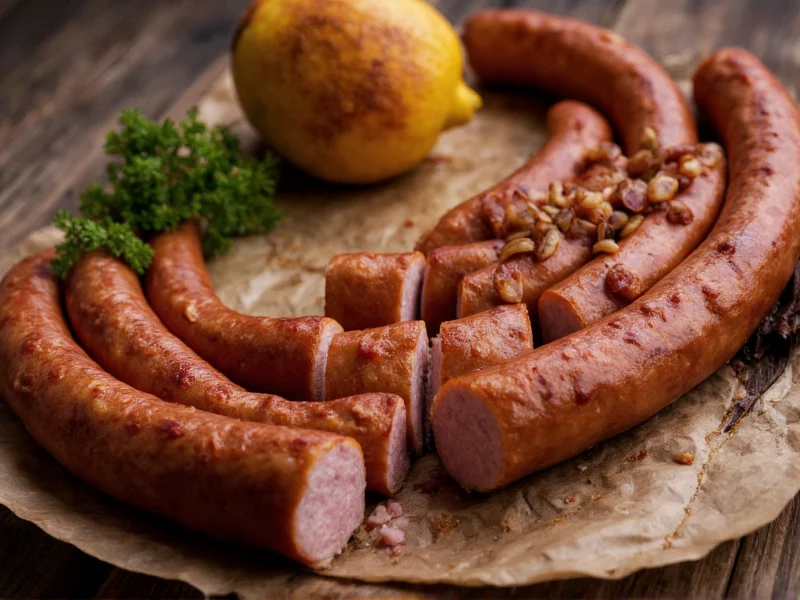When searching for "mythical sausage," many people expect to discover a legendary food item with roots in ancient folklore or culinary history. However, no such traditional dish exists in documented culinary heritage or mythological texts. The term likely emerged from modern creative contexts where fantasy elements blend with everyday food concepts. Understanding what "mythical sausage" actually refers to requires examining how contemporary culture repurposes mythological themes in unexpected ways.
Debunking the Mythical Sausage Concept
The phrase "mythical sausage" creates cognitive dissonance because it combines two seemingly incompatible elements: the mundane reality of sausage as a common food product and the fantastical nature of mythology. Sausages themselves have ancient origins dating back to Babylonian times around 3600 BCE, but none were ever described as "mythical" in historical records. This linguistic collision makes the term memorable and intriguing, which explains its occasional appearance in creative works.
Possible Interpretations of Mythical Sausage
While not an established concept, "mythical sausage" appears in several contemporary contexts:
| Context | Description | Examples |
|---|---|---|
| Fantasy Literature & Games | Creative food items in fictional worlds | "Dragonfire Sausage" in RPGs, "Unicorn Breakfast Links" in fantasy novels |
| Internet Culture | Memes and humorous concepts | "Mythical sausage" as an inside joke or absurdist humor |
| Culinary Marketing | Branding for novelty food products | Artisanal sausages with "legendary" claims or fantasy-themed restaurants |
| Linguistic Misunderstanding | Misspelling or mishearing of similar terms | "Mythical species" misheard as "mythical sausage" |
Legitimate Mythical Foods in Folklore
While "mythical sausage" itself isn't authentic, many cultures do feature legendary food items in their mythologies. These genuine mythical foods provide context for why the "mythical sausage" concept resonates with people:
- Ambrosia and Nectar - The food and drink of Greek gods that granted immortality
- Soma - A ritual drink in Vedic tradition believed to have divine properties
- The Salmon of Knowledge - Irish mythology features this fish that granted wisdom
- Hallucinogenic Mushrooms - Certain cultures incorporated psychoactive fungi into spiritual practices
Why the Mythical Sausage Confusion Persists
The persistence of the "mythical sausage" concept stems from several cultural factors. First, the internet enables rapid spread of niche ideas that might otherwise remain obscure. Second, modern fantasy literature and gaming frequently invent culinary elements to build immersive worlds, sometimes using familiar food items like sausages as anchors for creativity. Third, linguistic patterns make the term plausible—"mythical" commonly modifies nouns, and "sausage" appears in many compound food terms.
Food historians note that sausage-making traditions often carry quasi-mythical status in various cultures. For example, German Metzgerei (butcher shops) maintain traditions passed down through generations, and Italian salsiccia recipes are treated with near-religious reverence in some communities. This cultural weight around sausage-making might contribute to the "mythical" association.
Exploring Related Culinary Concepts
Those interested in "mythical sausage" might find genuine value in these related topics:
- Historical Sausage Varieties - Many traditional sausages have fascinating origins, like British black pudding or Spanish morcilla
- Fantasy Food in Literature - Works like Tolkien's descriptions of elven lembas bread or the feasts in Game of Thrones
- Culinary Folklore - Stories behind dishes like Hungarian goulash or Polish kielbasa
- Modern Creative Cuisine - Molecular gastronomy and themed restaurants that create "magical" dining experiences
Conclusion: Separating Fact from Fictional Food
While "mythical sausage" captures the imagination, it remains a modern invention rather than a genuine historical or mythological concept. The term's appeal lies in its juxtaposition of the ordinary (sausage) with the extraordinary (mythical), reflecting our cultural tendency to infuse everyday items with fantastical elements. For those seeking authentic mythical foods, numerous documented examples exist across global traditions—just not in sausage form. Understanding this distinction helps separate internet-born concepts from culturally significant food traditions with real historical roots.
Frequently Asked Questions
Is mythical sausage a real historical food item?
No, mythical sausage is not a genuine historical or traditional food item. While sausages themselves have ancient origins dating back to Babylonian times, none were ever documented as "mythical" in historical culinary records or mythological texts. The term appears to be a modern creative concept.
Where did the term mythical sausage originate?
The exact origin of "mythical sausage" is unclear, but it likely emerged from internet culture, fantasy gaming communities, or as a linguistic misunderstanding. It appears to be a relatively recent concept with no documented historical usage prior to the digital age.
Are there any real mythical foods similar to what people imagine mythical sausage to be?
Yes, many cultures feature genuine mythical foods in their folklore, though none are sausages. Examples include ambrosia (food of Greek gods), soma (sacred Vedic drink), and the Salmon of Knowledge from Irish mythology. These authentic mythical foods often carry spiritual or transformative properties in their respective traditions.
Why do people search for mythical sausage?
People search for mythical sausage for several reasons: they may have encountered the term in fantasy literature or gaming, heard it as an internet meme, misunderstood a similar phrase, or are curious if it refers to a legitimate culinary concept. The term's intriguing combination of ordinary and fantastical elements makes it memorable.











 浙公网安备
33010002000092号
浙公网安备
33010002000092号 浙B2-20120091-4
浙B2-20120091-4